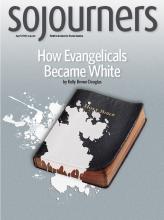THIS BOOK SURPRISED me. Millennials and the Mission of God incarnates the “prophetic dialogue” of the subtitle. There are many books about millennials, but here a representative speaks for herself and an older interlocutor listens and responds to the concerns and arguments voiced. Together, baby boomer Andrew Bush and millennial Carolyn Wason ponder the future of the church, how Christianity is changing, and how to engage millennials.
Those with no affiliation, the Nones, are growing; traditional ministry models are failing. Wason, with her background in anthropology, sheds light on why. Her prose is playful and filled with self-deprecation as she laughs at her generation’s idiosyncrasies. As she muses on hashtag activism and Harry Potter, she is frank, openly discussing the role fear plays in millennial evangelism. The long history of Christians oppressing people of other faiths weighs heavily on the shoulders of this emerging generation. Afraid of unconsciously leveraging an ill-gotten Christian privilege, many millennials retreat from traditional evangelizing.
For Wason, the question of faith is not “Is it true?” but rather, “Does it matter?” Thus, her doubts and questions center not on the Bible’s veracity, but on the influence of the church on the world. Her observations will resonate with many millennials.
Read the Full Article

